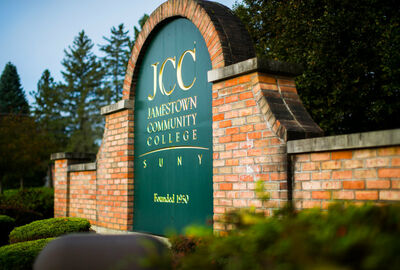In the summer of 2019, not long after Paula Snyder was named executive director of Jamestown Community College’s Cattaraugus County Campus, she was approached by the county’s environmental health director, Eric Wohlers.
Wohlers told Snyder that local municipalities were desperate for certification and training courses that were closer to home for their water treatment operators. As it was, communities in Cattaraugus, Chautauqua, and Allegany counties were often shipping their operators halfway across the state for required trainin
Olean Water Filtration Plant, explains how the plant’s
controls work.
“For our small communities that are cash strapped,” Wohlers said, “it was almost cost prohibitive to send more than one person.”
The initial conversation between Snyder and Wohlers led to more meetings. They looped in Bill Boria, Wolhers’ counterpart in Chautauqua County, as well as Kathleen Martel, JCC’s Workforce Readiness program manager.
It all led to JCC’s announcement last March that it would begin hosting water treatment certification courses at its Cattaraugus County campus in Olean and North County campus in Dunkirk.
JCC also offers New York State Department of Health (NYSDOH) certification exams on campus. And, just recently, the college added recertification classes to its offerings, which Martel said are very popular.
“It’s nice to be able to meet a demand that we had in the area that wasn’t being met,” Martel said.
There are future plans for wastewater treatment courses, too
Although a formal college education isn’t required for public water treatment positions, New York state operators must complete at least six months of on-the-job training, take certification courses, and pass a NYSDOH test to become certified.
Once certified, operators are required to take yearly courses to maintain their certification.
Having local classes is convenient, but in many ways it’s also a necessity.
As Boria said, JCC’s training options help local water systems “meet state and federal compliance for their operations program.”
“Every community has a very serious obligation and liability to provide drinking water to all residents that is safe and meets all federal and state drinking water regulations,” Wohlers said. “It’s quite a responsibility that they have to take seriously.”
However, keeping operators trained on the latest in the drinking water industry was costly and inefficient for local municipalities when course options were so far flung across the state.
Certification training can range from three days to two weeks depending on the level of certification. One of the closest training venues was SUNY Morrisville, east of Syracuse.
“That’s not some place you drive to every morning, attend class, and come home,” Wohlers said. “You had to pay for food, lodging, travel, and overtime.”
by computer inside the Olean Water Filtration Plant.
Cattaraugus and Chautauqua counties have approximately 60 public water supplies each that must be manned by certified operators. The three counties of Cattaraugus, Chautauqua and Allegany combined employ more than 250 certified operators that help maintain water for cities, towns, villages, subdivisions, and even mobile home parks.
Wohlers said many operators are reaching retirement age. “Like any job,” he added, “there’s turnover in these positions.”
It’s not something Boria takes lightly. He pointed to U.S. Bureau of Labor projections, which forecast 30,000 retirements of water and wastewater treatment operators by 2024, plus the addition of 7,000 new positions. He added that an informal study confirmed a high number of operator retirements in Cattaraugus and Chautauqua counties in the “near future.”
“Certification requirements,” Boria said, “make the problem of keeping these positions filled difficult.”
That’s where JCC comes in. In addition to certification training for Class A, B, C, and D grade operators, the college offers 5-hour recertification courses in math, hydraulics, coagulation treatment, and filter operations.
Classes at JCC are led by John Mogavero, a retired chemist and chief water treatment operator for the Erie County Water Authority.
The job is best suited for people who like math, science, and working with their hands. There is also quite a bit of technology involved.
“A trained operator has to go to their well house or water filtration plant everyday,” Wohlers said. “There’s certain tests they have to run. They have to take daily records and submit monthly operation reports to the health department. They’re using all these products that are approved for drinking water but they can only be applied in a certain dosage. Somebody has to be constantly monitoring that equipment so that they’re not exceeding the allowable dosage and the water is safe.”
Public operator positions offer good pay, health and retirement benefits, and job security.
“That’s what intrigued me,” Snyder said. “They have a career for life with a municipal water job. This is how we keep people living here and working here.”
For more information, visit www.sunyjcc.edu/workforcereadiness or call 716.376.7586.

